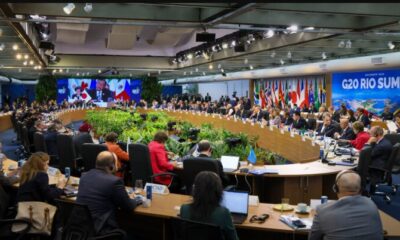World News
Live Market Tracker: Stocks Wobble as New Outbreaks Emerge
Published
5 years agoon
[ad_1]
The Fed expands its corporate bond-buying program.
The Federal Reserve said on Monday that it would begin to buy debt issued by individual corporations based on a broad index of corporate bonds in the United States, a new step in the central bank’s efforts to keep credit flowing freely amid the coronavirus pandemic.
Officials voted unanimously to expand the so-called Secondary Market Corporate Credit Facility, which it unveiled in May. The program is meant to allow companies to continue borrowing money at a time of high stress on the financial system following the steep economic decline from the pandemic. Originally, the Fed did that by purchasing exchange traded funds, which trade like stocks but have broad exposure to corporate bonds.
Under the expansion approved on Monday, which Fed officials had foreshadowed in their creation of the program, the Fed will now “begin buying a broad and diversified portfolio of corporate bonds to support market liquidity and the availability of credit for large employers,” officials said in a news release. The purchases, they added, will “create a corporate bond portfolio that is based on a broad, diversified market index of U.S. corporate bonds.” Fed officials had not previously signaled that the individual corporate bond purchases would follow an index approach.
Even before buying a single bond, the Fed managed to achieve its main goal with its primary and secondary bond-buying programs: restarting the frozen corporate debt market. It first announced that it would set up the programs on March 23, and the mere promise of a backstop revived the market, allowing companies to issue debt to raise needed cash amid the coronavirus economic downturn.
Once they are fully up and running, the Fed’s programs will buy both newly issued debt on the primary market and debt that is already being traded on a secondary market. The programs were expanded on April 9 to include some junk bonds.
‘Much more will be needed,’ a Federal Reserve official says.
A Federal Reserve official recommended further government spending to help ensure that the recovery from the pandemic-induced recession was faster — and reached vulnerable populations much more quickly — than those that followed previous deep downturns.
“The hardest lesson from both the Great Depression and the Great Recession is that it took a decade or more for the economy to fully recover and for the benefits of growth to reach all of those displaced by the shock,” the president of the Federal Reserve Bank of San Francisco, Mary C. Daly, said on Monday.
“A decade is too long,” she added. “We can’t wait 10 years for an economic recovery to reach everyone.”
Ms. Daly said that many of the recent job losses were likely to be permanent and that unless policymakers worked to “build the foundations for a sustained and robust recovery,” the job market was at risk of losing workers.
“We have to commit — now — to not letting this happen,” she said, adding that the Fed should leave interest rates low even as the economy recovered.
“We also need fiscal policymakers to commit to sustained investments in our economic future,” she said, noting that Congress has already approved emergency spending packages but specifically recommended further investments in health, education and digital infrastructure.
“Much more will be needed in order to build a strong economic foundation that will allow a full recovery and sustained expansion,” she said.
Stocks are unsteady as fresh coronavirus cases raise second wave concerns.
Stocks on Wall Street slipped on Monday, following global markets lower, as coronavirus outbreaks around the world raised concerns about the potential for a second wave of the pandemic.
The mood in financial markets improved, however, as the day went on. After falling more than 2 percent, the S&P 500 was down only slightly by midday. The technology heavy Nasdaq composite recouped all of its losses from earlier in the day, and oil prices also rebounded.
Sentiment in financial markets has been unsteady in recent days, after markets plunged Thursday as warnings that the economic recovery will be slower than hoped for, and the prospect of a second wave of coronavirus infections, seemed to shift the focus back to risks.
On Thursday, the S&P 500 fell by about 6 percent, its sharpest drop since mid-March.
On Monday, investors were reacting in part to bad news out of China, where some monthly economic indicators were weaker than expected, and where officials are battling a new spate of coronavirus cases in Beijing.
In the United States, Arizona, Florida and Texas have also reported higher infection numbers, and Gov. Andrew M. Cuomo of New York said that the state might have to reinstate lockdown conditions.
Stocks that have been hit hardest by pandemic-related restrictions — airlines, cruise operators and some retailers — were the hardest hit on Monday.
Reversing course, Steven Mnuchin says he will add more oversight to a small-business loan program.
Facing backlash for keeping the recipients of a $660 billion small-business bailout secret, Treasury Secretary Steven Mnuchin reversed course on Monday and said that he would look for a way to allow for more oversight of where the government-backed loan money was going.
The apparent reversal comes days after Mr. Mnuchin told a Senate committee that information about who was receiving the loan money was “proprietary” and not subject to public release. The lack of transparency threatened to derail future economic relief efforts and was quickly becoming a political problem for the White House, as Democrats and Republicans sought additional information about the loans offered through Paycheck Protection Program.
“I will be having discussions with the Senate Small Business Committee and others on a bipartisan basis to strike the appropriate balance for proper oversight of PPP loans and appropriate protection of small business information,” Mr. Mnuchin said on Twitter on Monday.
Bank industry groups believed that the loan information would eventually be made public because most of the Small Business Administration’s loans are subject to public records requests. The P.P.P. loan application form also indicates that the loans could be subject to such disclosures.
Earlier this month, Senator Marco Rubio, Republican of Florida, and Senator Ben Cardin, Democrat of Maryland, sent a letter to Mr. Mnuchin and Jovita Carranza, the small-business administrator, calling on them to release detailed information about borrowers and their loans.
“We are going to have full transparency” of the bailout funds, the Treasury secretary said in March. Democrats have seized on Mr. Mnuchin’s refusal to do so as evidence that the Trump administration is hiding where the bailout money is going.
“Mnuchin promised transparency in coronavirus aid, now he’s keeping it secret,” the Democratic National Committee’s “war room” declared in an email blast.
United Airlines raises $5 billion backed by its loyalty program.
United Airlines said Monday it had secured a $5 billion loan backed by its MileagePlus frequent flier program, part of its plans to have up to $17 billion in cash by the end of September.
That amount, about three times the airline’s typical target, would be enough to help United survive a second or third wave of coronavirus shutdowns and sharp drops in ticket revenue. The $17 billion figure includes a $4.5 billion federal loan that United has not yet committed to.
So far, American Airlines is the only large U.S. airline to confirm that it would borrow money from the federal government under a provision of a $2.2 trillion stimulus measure Congress approved this year. American said on Friday that it planned to borrow $4.75 billion under that program, a loan that would be backed by its frequent flier program. Separately, all the large airlines have accepted money from a $25 billion program Congress created to help the industry meet its payroll through September.
Loyalty programs have become a significant part of the airline business. They have helped companies protect themselves against the ups and downs of the economy by creating new income streams. Under the terms of the loan announced on Monday, United will retain control over MileagePlus, which generated more than $5 billion in cash flow last year and about 12 percent of the airline’s revenue.
United also said it expected to average $40 million in daily losses throughout the second quarter of the year. The company said it hoped to reduce that to $30 million in the third quarter. American and Delta Air Lines said last week that they expected to end June with $40 million in daily losses.
Germany buys a stake in the vaccine firm Trump reportedly wanted.
The German government will invest 300 million euros, or $340 million, and take part ownership of a company that is developing a coronavirus vaccine, the economics ministry said Monday, part of an effort to ensure Europe is not dependent on foreign manufacturers when a vaccine is developed.
The company, CureVac, was the subject of reports in April — denied by the company — that President Trump had tried to buy it as part of an attempt to get preferred access to a vaccine. The president did meet in April with CureVac’s chief executive at the time, Daniel Menichella, who later resigned.
“We need this important research and technology in Germany and Europe,” Peter Altmaier, the German economics minister, said in a statement Monday. The government said it would not meddle in CureVac management. But it will take a 23 percent stake in what Mr. Altmaier called a first step toward ensuring independence in vaccine production.
CureVac, based in the university town of Tübingen in southern Germany, has said it would begin clinical trials this summer of a coronavirus vaccine. If the vaccine proves successful, the company is capable of producing hundreds of millions of doses per year with an existing facility, and plans to expand capacity to billions of doses per year.
Dietmar Hopp, one of the founders of the German software company SAP, owns a majority of CureVac. Other investors include the Bill & Melinda Gates Foundation.
Here’s the business news to watch this week.
🗣 Jerome Powell, the Federal Reserve chairman, discusses the central bank’s latest economic report to committees at the Senate (Tuesday) and House (Wednesday). His downbeat outlook spooked markets last week, and he is likely to hint that lawmakers should be as aggressive as the Fed in propping up the economy.
🏦 In other central banking news, the Bank of Japan is not expected to unveil any new stimulus measures at its policymaking meeting on Tuesday, while the Bank of England will probably announce on Thursday an increase to its bond-buying program.
📈 On Tuesday, data for U.S. retail sales and industrial production are expected to show increases in May, following steep declines in April.
📅 Friday is Juneteenth, the annual holiday celebrating the end of slavery in the United States. It has gained new resonance during the protests against racial discrimination and police brutality. Several companies, including Nike and Twitter, have made it an official company holiday.
💵 We’re headed into a quiet stretch for company earnings, with this week’s noteworthy reports coming from Oracle on Tuesday and Kroger on Thursday.
BP told shareholders on Monday that the company expected to write off $13 billion to $17.5 billion of the value of its oil and gas holdings when it reports second-quarter earnings on Aug. 4.
The write downs — a reflection that oil and gas fields have fallen in value — come as Bernard Looney, who became chief executive in February, pursues a rapid makeover of the London-based oil giant.
A reorganization led by Mr. Looney is expected to result in a reduction of 10,000 jobs, or nearly 15 percent of the company’s work force. He also wants to change the way BP does business to meet a commitment to become carbon neutral by 2050.
The company said that the write downs of up to 12 percent of the previous book value were partly a result of a reduction in its long-term forecasts of the price of oil by about 30 percent, to $55 a barrel. It is also similarly downgrading its long-term price for natural gas.
The company said it assumed that the pandemic would have “an enduring impact” on the global economy and accelerate a shift to lower-carbon energy consumption as countries seek to rebuild their economies.
The write downs will come both from existing oil and gas fields and from those in places like the Gulf of Mexico and Canada where the company has undeveloped holdings that it may decide not to exploit in the current circumstances.
As China tries to rebound, its movie theaters remain closed.
China appeared to have nearly eradicated the coronavirus within its borders last month, but that was not enough to get people in the country spending again — and with a new outbreak in Beijing over the past several days, a full economic recovery could be even further away.
Restaurants, bars and shopping malls were open across China last month except for in a small area near the border with North Korea and Russia, which had a coronavirus outbreak in May. But retail sales nonetheless fell 2.8 percent nationwide in May compared with a year ago.
That result, which was worse than most economists expected, is likely to prompt renewed discussion over a politically difficult question: whether to reopen the country’s cinemas, which are practically the only large category of retail spending that remains completely closed.
The closure of cinemas has been a big blow to shopping malls at a time when buying is increasingly moving online.
Malls in China and around the world rely heavily on cinemas to draw people out of their homes, with the hope that they will stay after the movies to dine or shop. Unlike the malls, car dealerships had a fairly good month in May, with sales up 1.9 percent from an already strong month last year.
But Xi Jinping, the country’s leader, said at the end of March that cinemas were not needed, and no one has dared to challenge his decision publicly since then. “If anyone wants to watch a movie, just watch it online,” Mr. Xi said during a visit on March 31 to Zhejiang Province.
Exports were also weak in May. Beijing said last week that they had fallen 3.3 percent.
Industrial production was up 4.4 percent last month compared with a year ago, also slightly below expectations. Factory output has consistently run well ahead of retail sales this spring, raising worries that unsold inventories may pile up and set off another round of production cutbacks.
Catch up: Here’s what else is happening.
-
Shares in Hertz fell about 15 percent Monday morning after the car rental agency announced a $500 million stock offering. A judge approved the unusual sale on Friday at Hertz’s request after the company saw an opportunity in its surprisingly buoyant share price.
-
SAS, the Scandinavian airline, said on Monday that it would need an additional 12.5 billion Swedish krona, or $1.3 billion, to continue operating. The airline said that part of that sum was expected to come from the Swedish authorities, who will submit to Parliament a proposal to invest 5 billion krona. The Swedish and Danish governments last month agreed to back a loan facility valued at 3.3 billion krona for the ailing airline.
Reporting was contributed by Alan Rappeport, Jeanna Smialek, Jim Tankersley, Niraj Chokshi, Jack Ewing, Matt Phillips, Mohammed Hadi, Keith Bradsher, Stanley Reed, Jason Karaian, Carlos Tejada, Brooks Barnes, Nicole Sperling, Paul Sullivan and Kevin Granville.
[ad_2]
Source link
Comments
The Kenyan Digest Team

You may like

Lamine Yamal: The Teen Who’s Redefining Spanish Football

BRICS Expansion: New Members, Currency Dreams, and a Bold Bid to Eclipse the West

Unveiling Mohamed Salah: The Egyptian King’s Secrets That Have the World Googling Non-Stop

Migration & Refugee Crises: Europe and the Americas Grapple with New Humanitarian Pressures

Global South Rising: Africa, Asia, and Latin America Demand a Louder Voice in World Governance

The War in Ukraine: A Comprehensive Analysis of the Conflict

The War in Ukraine: A Comprehensive Analysis of the Conflict

Unveiling Mohamed Salah: The Egyptian King’s Secrets That Have the World Googling Non-Stop

Global South Rising: Africa, Asia, and Latin America Demand a Louder Voice in World Governance

BRICS Expansion: New Members, Currency Dreams, and a Bold Bid to Eclipse the West

Migration & Refugee Crises: Europe and the Americas Grapple with New Humanitarian Pressures

Lamine Yamal: The Teen Who’s Redefining Spanish Football

The Invisible Hand of AI: How Machine Learning is Building the Resilient, Self-Healing Supply Chains of Tomorrow

The AI Arms Race: How Cyber-Defenders are Using AI to Fight AI-Generated Threats

Naftunes Productions: Shaping the Future of Animation in Kenya

High Court Halts Equity Bank’s Takeover Bid on Swafi Foods in Landmark Ruling
Trending
-

 General News1 week ago
General News1 week agoLamine Yamal: The Teen Who’s Redefining Spanish Football
-

 Business News1 week ago
Business News1 week agoBRICS Expansion: New Members, Currency Dreams, and a Bold Bid to Eclipse the West
-

 Jobs1 week ago
Jobs1 week agoUnveiling Mohamed Salah: The Egyptian King’s Secrets That Have the World Googling Non-Stop
-

 General News1 week ago
General News1 week agoMigration & Refugee Crises: Europe and the Americas Grapple with New Humanitarian Pressures
-

 Business News1 week ago
Business News1 week agoGlobal South Rising: Africa, Asia, and Latin America Demand a Louder Voice in World Governance
-

 Politics1 week ago
Politics1 week agoThe War in Ukraine: A Comprehensive Analysis of the Conflict